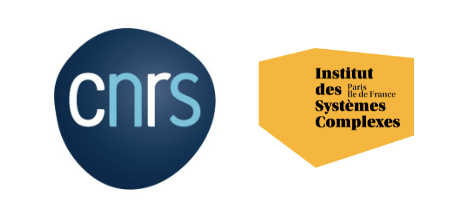OpenMOLE (Open MOdeL Experiment) makes it simple to execute your programs on distributed computing environments. If you want to execute the same program for many different inputs (parameters or datasets), OpenMOLE is the tool that you need. The typical usage of OpenMOLE are high performance model calibration, model exploration, machine learning, optimization, data processing.
- Works with your programs – Java, Binary exe, NetLogo, R, SciLab, Python, C++…
- Distributed computing – Works on your multi-core machines, clusters, grids, desktop grid.
- Expressive – Graphical and scripted workflow system to describe your naturally parallel processes.
- Scalable – Handles millions of tasks, years of computation, and GBs of data.
- Mature – Developed since 2008 and widely used.
- Open – AGPLv3 free software license.
ACCESS THIS SERVICE
To access this service, you must apply online and, at the same time, contact the team on the OpenMOLE chat.
PROJECTS
PUBLICATIONS
Citer OpenMOLE
Romain Reuillon, Mathieu Leclaire, Sebastien Rey-Coyrehourcq, OpenMOLE, a workflow engine specifically tailored for the distributed exploration of simulation models published in Future Generation Computer Systems, 2013BibTex
Publications
396913
U4ZMS4JE
1
apa
50
default
38613
https://iscpif.fr/wp-content/plugins/zotpress/
%7B%22status%22%3A%22success%22%2C%22updateneeded%22%3Afalse%2C%22instance%22%3Afalse%2C%22meta%22%3A%7B%22request_last%22%3A0%2C%22request_next%22%3A0%2C%22used_cache%22%3Atrue%7D%2C%22data%22%3A%5B%7B%22key%22%3A%226UVMTMDZ%22%2C%22library%22%3A%7B%22id%22%3A396913%7D%2C%22meta%22%3A%7B%22lastModifiedByUser%22%3A%7B%22id%22%3A2937624%2C%22username%22%3A%22mcalon%22%2C%22name%22%3A%22%22%2C%22links%22%3A%7B%22alternate%22%3A%7B%22href%22%3A%22https%3A%5C%2F%5C%2Fwww.zotero.org%5C%2Fmcalon%22%2C%22type%22%3A%22text%5C%2Fhtml%22%7D%7D%7D%2C%22creatorSummary%22%3A%22Reuillon%20et%20al.%22%2C%22parsedDate%22%3A%222013%22%2C%22numChildren%22%3A0%7D%2C%22bib%22%3A%22%3Cdiv%20class%3D%5C%22csl-bib-body%5C%22%20style%3D%5C%22line-height%3A%202%3B%20padding-left%3A%201em%3B%20text-indent%3A-1em%3B%5C%22%3E%5Cn%20%20%3Cdiv%20class%3D%5C%22csl-entry%5C%22%3EReuillon%2C%20R.%2C%20Leclaire%2C%20M.%2C%20%26amp%3B%20Rey-Coyrehourcq%2C%20S.%20%282013%29.%20OpenMOLE%2C%20a%20workflow%20engine%20specifically%20tailored%20for%20the%20distributed%20exploration%20of%20simulation%20models.%20%3Ci%3EFuture%20Generation%20Computer%20Systems%3C%5C%2Fi%3E%2C%20%3Ci%3E29%3C%5C%2Fi%3E%288%29%2C%201981%26%23x2013%3B1990.%20%3Ca%20href%3D%27https%3A%5C%2F%5C%2Fdoi.org%5C%2Fhttp%3A%5C%2F%5C%2Fdx.doi.org%5C%2F10.1016%5C%2Fj.future.2013.05.003%27%3Ehttps%3A%5C%2F%5C%2Fdoi.org%5C%2Fhttp%3A%5C%2F%5C%2Fdx.doi.org%5C%2F10.1016%5C%2Fj.future.2013.05.003%3C%5C%2Fa%3E%3C%5C%2Fdiv%3E%5Cn%3C%5C%2Fdiv%3E%22%2C%22data%22%3A%7B%22itemType%22%3A%22journalArticle%22%2C%22title%22%3A%22OpenMOLE%2C%20a%20workflow%20engine%20specifically%20tailored%20for%20the%20distributed%20exploration%20of%20simulation%20models%22%2C%22creators%22%3A%5B%7B%22creatorType%22%3A%22author%22%2C%22firstName%22%3A%22R.%22%2C%22lastName%22%3A%22Reuillon%22%7D%2C%7B%22creatorType%22%3A%22author%22%2C%22firstName%22%3A%22M.%22%2C%22lastName%22%3A%22Leclaire%22%7D%2C%7B%22creatorType%22%3A%22author%22%2C%22firstName%22%3A%22S.%22%2C%22lastName%22%3A%22Rey-Coyrehourcq%22%7D%5D%2C%22abstractNote%22%3A%22%22%2C%22date%22%3A%222013%22%2C%22language%22%3A%22%22%2C%22DOI%22%3A%22http%3A%5C%2F%5C%2Fdx.doi.org%5C%2F10.1016%5C%2Fj.future.2013.05.003%22%2C%22ISSN%22%3A%220167-739X%22%2C%22url%22%3A%22%22%2C%22collections%22%3A%5B%22U4ZMS4JE%22%2C%22DFIEKF27%22%5D%2C%22dateModified%22%3A%222020-03-09T10%3A47%3A58Z%22%7D%7D%2C%7B%22key%22%3A%22DJXCHUIB%22%2C%22library%22%3A%7B%22id%22%3A396913%7D%2C%22meta%22%3A%7B%22creatorSummary%22%3A%22Cottineau%20et%20al.%22%2C%22parsedDate%22%3A%222015%22%2C%22numChildren%22%3A0%7D%2C%22bib%22%3A%22%3Cdiv%20class%3D%5C%22csl-bib-body%5C%22%20style%3D%5C%22line-height%3A%202%3B%20padding-left%3A%201em%3B%20text-indent%3A-1em%3B%5C%22%3E%5Cn%20%20%3Cdiv%20class%3D%5C%22csl-entry%5C%22%3ECottineau%2C%20C.%2C%20Chapron%2C%20P.%2C%20%26amp%3B%20Reuillon%2C%20R.%20%282015%29.%20Growing%20Models%20from%20the%20Bottom%20Up.%20an%20Evaluation-Based%20Incremental%20Modelling%20Method%20%28EBIMM%29%20Applied%20to%20the%20Simulation%20of%20Systems%20of%20Cities.%20%3Ci%3EJournal%20of%20Artificial%20Societies%20and%20Social%20Simulation%3C%5C%2Fi%3E%2C%20%3Ci%3E18%3C%5C%2Fi%3E%284%29.%20%3Ca%20href%3D%27https%3A%5C%2F%5C%2Fdoi.org%5C%2F10.18564%5C%2Fjasss.2828%27%3Ehttps%3A%5C%2F%5C%2Fdoi.org%5C%2F10.18564%5C%2Fjasss.2828%3C%5C%2Fa%3E%3C%5C%2Fdiv%3E%5Cn%3C%5C%2Fdiv%3E%22%2C%22data%22%3A%7B%22itemType%22%3A%22journalArticle%22%2C%22title%22%3A%22Growing%20Models%20from%20the%20Bottom%20Up.%20an%20Evaluation-Based%20Incremental%20Modelling%20Method%20%28EBIMM%29%20Applied%20to%20the%20Simulation%20of%20Systems%20of%20Cities%22%2C%22creators%22%3A%5B%7B%22creatorType%22%3A%22author%22%2C%22firstName%22%3A%22Cl%5Cu00e9mentine%22%2C%22lastName%22%3A%22Cottineau%22%7D%2C%7B%22creatorType%22%3A%22author%22%2C%22firstName%22%3A%22Paul%22%2C%22lastName%22%3A%22Chapron%22%7D%2C%7B%22creatorType%22%3A%22author%22%2C%22firstName%22%3A%22Romain%22%2C%22lastName%22%3A%22Reuillon%22%7D%5D%2C%22abstractNote%22%3A%22%22%2C%22date%22%3A%222015%22%2C%22language%22%3A%22en%22%2C%22DOI%22%3A%2210.18564%5C%2Fjasss.2828%22%2C%22ISSN%22%3A%221460-7425%22%2C%22url%22%3A%22http%3A%5C%2F%5C%2Fjasss.soc.surrey.ac.uk%5C%2F18%5C%2F4%5C%2F9.html%22%2C%22collections%22%3A%5B%22U4ZMS4JE%22%2C%22DFIEKF27%22%5D%2C%22dateModified%22%3A%222015-11-08T12%3A04%3A21Z%22%7D%7D%2C%7B%22key%22%3A%224KTM7CPR%22%2C%22library%22%3A%7B%22id%22%3A396913%7D%2C%22meta%22%3A%7B%22creatorSummary%22%3A%22Ch%5Cu00e9rel%20et%20al.%22%2C%22parsedDate%22%3A%222015-09-14%22%2C%22numChildren%22%3A0%7D%2C%22bib%22%3A%22%3Cdiv%20class%3D%5C%22csl-bib-body%5C%22%20style%3D%5C%22line-height%3A%202%3B%20padding-left%3A%201em%3B%20text-indent%3A-1em%3B%5C%22%3E%5Cn%20%20%3Cdiv%20class%3D%5C%22csl-entry%5C%22%3ECh%26%23xE9%3Brel%2C%20G.%2C%20Cottineau%2C%20C.%2C%20%26amp%3B%20Reuillon%2C%20R.%20%282015%29.%20Beyond%20Corroboration%3A%20Strengthening%20Model%20Validation%20by%20Looking%20for%20Unexpected%20Patterns.%20%3Ci%3EPLOS%20ONE%3C%5C%2Fi%3E%2C%20%3Ci%3E10%3C%5C%2Fi%3E%289%29%2C%20e0138212.%20%3Ca%20href%3D%27https%3A%5C%2F%5C%2Fdoi.org%5C%2F10.1371%5C%2Fjournal.pone.0138212%27%3Ehttps%3A%5C%2F%5C%2Fdoi.org%5C%2F10.1371%5C%2Fjournal.pone.0138212%3C%5C%2Fa%3E%3C%5C%2Fdiv%3E%5Cn%3C%5C%2Fdiv%3E%22%2C%22data%22%3A%7B%22itemType%22%3A%22journalArticle%22%2C%22title%22%3A%22Beyond%20Corroboration%3A%20Strengthening%20Model%20Validation%20by%20Looking%20for%20Unexpected%20Patterns%22%2C%22creators%22%3A%5B%7B%22creatorType%22%3A%22author%22%2C%22firstName%22%3A%22Guillaume%22%2C%22lastName%22%3A%22Ch%5Cu00e9rel%22%7D%2C%7B%22creatorType%22%3A%22author%22%2C%22firstName%22%3A%22Cl%5Cu00e9mentine%22%2C%22lastName%22%3A%22Cottineau%22%7D%2C%7B%22creatorType%22%3A%22author%22%2C%22firstName%22%3A%22Romain%22%2C%22lastName%22%3A%22Reuillon%22%7D%2C%7B%22creatorType%22%3A%22editor%22%2C%22firstName%22%3A%22Frederic%22%2C%22lastName%22%3A%22Amblard%22%7D%5D%2C%22abstractNote%22%3A%22%22%2C%22date%22%3A%222015-9-14%22%2C%22language%22%3A%22en%22%2C%22DOI%22%3A%2210.1371%5C%2Fjournal.pone.0138212%22%2C%22ISSN%22%3A%221932-6203%22%2C%22url%22%3A%22http%3A%5C%2F%5C%2Fdx.plos.org%5C%2F10.1371%5C%2Fjournal.pone.0138212%22%2C%22collections%22%3A%5B%22U4ZMS4JE%22%2C%22DFIEKF27%22%2C%2269R4X9VQ%22%5D%2C%22dateModified%22%3A%222015-09-18T16%3A11%3A41Z%22%7D%7D%2C%7B%22key%22%3A%22QETHKM68%22%2C%22library%22%3A%7B%22id%22%3A396913%7D%2C%22meta%22%3A%7B%22creatorSummary%22%3A%22Alvarez%20et%20al.%22%2C%22parsedDate%22%3A%222013%22%2C%22numChildren%22%3A0%7D%2C%22bib%22%3A%22%3Cdiv%20class%3D%5C%22csl-bib-body%5C%22%20style%3D%5C%22line-height%3A%202%3B%20padding-left%3A%201em%3B%20text-indent%3A-1em%3B%5C%22%3E%5Cn%20%20%3Cdiv%20class%3D%5C%22csl-entry%5C%22%3EAlvarez%2C%20I.%2C%20Aldama%2C%20R.%20D.%2C%20Martin%2C%20S.%2C%20%26amp%3B%20Reuillon%2C%20R.%20%282013%29.%20Assessing%20the%20Resilience%20of%20Socio-ecosystems%3A%20Coupling%20Viability%20Theory%20and%20Active%20Learning%20with%20Kd-trees.%20Application%20to%20Bilingual%20Societies.%20%3Ci%3EProceedings%20of%20the%20Twenty-Third%20International%20Joint%20Conference%20on%20Artificial%20Intelligence%3C%5C%2Fi%3E%2C%202776%26%23x2013%3B2782.%3C%5C%2Fdiv%3E%5Cn%3C%5C%2Fdiv%3E%22%2C%22data%22%3A%7B%22itemType%22%3A%22conferencePaper%22%2C%22title%22%3A%22Assessing%20the%20Resilience%20of%20Socio-ecosystems%3A%20Coupling%20Viability%20Theory%20and%20Active%20Learning%20with%20Kd-trees.%20Application%20to%20Bilingual%20Societies%22%2C%22creators%22%3A%5B%7B%22creatorType%22%3A%22author%22%2C%22firstName%22%3A%22I.%22%2C%22lastName%22%3A%22Alvarez%22%7D%2C%7B%22creatorType%22%3A%22author%22%2C%22firstName%22%3A%22R.%20De%22%2C%22lastName%22%3A%22Aldama%22%7D%2C%7B%22creatorType%22%3A%22author%22%2C%22firstName%22%3A%22S.%22%2C%22lastName%22%3A%22Martin%22%7D%2C%7B%22creatorType%22%3A%22author%22%2C%22firstName%22%3A%22R.%22%2C%22lastName%22%3A%22Reuillon%22%7D%5D%2C%22abstractNote%22%3A%22%22%2C%22date%22%3A%222013%22%2C%22proceedingsTitle%22%3A%22Proceedings%20of%20the%20Twenty-Third%20International%20Joint%20Conference%20on%20Artificial%20Intelligence%22%2C%22conferenceName%22%3A%22%22%2C%22language%22%3A%22%22%2C%22DOI%22%3A%22%22%2C%22ISBN%22%3A%22978-1-57735-633-2%22%2C%22url%22%3A%22%22%2C%22collections%22%3A%5B%22U4ZMS4JE%22%2C%22DFIEKF27%22%5D%2C%22dateModified%22%3A%222015-09-07T21%3A57%3A39Z%22%7D%7D%2C%7B%22key%22%3A%22WSMX9NCF%22%2C%22library%22%3A%7B%22id%22%3A396913%7D%2C%22meta%22%3A%7B%22creatorSummary%22%3A%22Passerat-Palmbach%20et%20al.%22%2C%22parsedDate%22%3A%222013%22%2C%22numChildren%22%3A0%7D%2C%22bib%22%3A%22%3Cdiv%20class%3D%5C%22csl-bib-body%5C%22%20style%3D%5C%22line-height%3A%202%3B%20padding-left%3A%201em%3B%20text-indent%3A-1em%3B%5C%22%3E%5Cn%20%20%3Cdiv%20class%3D%5C%22csl-entry%5C%22%3EPasserat-Palmbach%2C%20J.%2C%20Reuillon%2C%20R.%2C%20Mazel%2C%20C.%2C%20%26amp%3B%20Hill%2C%20D.%20R.%20C.%20%282013%29.%20Prototyping%20parallel%20simulations%20on%20manycore%20architectures%20using%20Scala%3A%20A%20case%20study.%20%3Ci%3EHigh%20Performance%20Computing%20and%20Simulation%20%28HPCS%29%2C%202013%20International%20Conference%3C%5C%2Fi%3E%2C%20405%26%23x2013%3B412.%20%3Ca%20href%3D%27https%3A%5C%2F%5C%2Fdoi.org%5C%2F10.1109%5C%2FHPCSim.2013.6641447%27%3Ehttps%3A%5C%2F%5C%2Fdoi.org%5C%2F10.1109%5C%2FHPCSim.2013.6641447%3C%5C%2Fa%3E%3C%5C%2Fdiv%3E%5Cn%3C%5C%2Fdiv%3E%22%2C%22data%22%3A%7B%22itemType%22%3A%22conferencePaper%22%2C%22title%22%3A%22Prototyping%20parallel%20simulations%20on%20manycore%20architectures%20using%20Scala%3A%20A%20case%20study%22%2C%22creators%22%3A%5B%7B%22creatorType%22%3A%22author%22%2C%22firstName%22%3A%22J.%22%2C%22lastName%22%3A%22Passerat-Palmbach%22%7D%2C%7B%22creatorType%22%3A%22author%22%2C%22firstName%22%3A%22R.%22%2C%22lastName%22%3A%22Reuillon%22%7D%2C%7B%22creatorType%22%3A%22author%22%2C%22firstName%22%3A%22C.%22%2C%22lastName%22%3A%22Mazel%22%7D%2C%7B%22creatorType%22%3A%22author%22%2C%22firstName%22%3A%22D.R.C.%22%2C%22lastName%22%3A%22Hill%22%7D%5D%2C%22abstractNote%22%3A%22%22%2C%22date%22%3A%222013%22%2C%22proceedingsTitle%22%3A%22High%20Performance%20Computing%20and%20Simulation%20%28HPCS%29%2C%202013%20International%20Conference%22%2C%22conferenceName%22%3A%22%22%2C%22language%22%3A%22%22%2C%22DOI%22%3A%2210.1109%5C%2FHPCSim.2013.6641447%22%2C%22ISBN%22%3A%22%22%2C%22url%22%3A%22%22%2C%22collections%22%3A%5B%22U4ZMS4JE%22%2C%22DFIEKF27%22%5D%2C%22dateModified%22%3A%222015-09-07T21%3A57%3A39Z%22%7D%7D%2C%7B%22key%22%3A%22JCCBUCZA%22%2C%22library%22%3A%7B%22id%22%3A396913%7D%2C%22meta%22%3A%7B%22creatorSummary%22%3A%22Passerat-Palmbach%20et%20al.%22%2C%22parsedDate%22%3A%222013%22%2C%22numChildren%22%3A0%7D%2C%22bib%22%3A%22%3Cdiv%20class%3D%5C%22csl-bib-body%5C%22%20style%3D%5C%22line-height%3A%202%3B%20padding-left%3A%201em%3B%20text-indent%3A-1em%3B%5C%22%3E%5Cn%20%20%3Cdiv%20class%3D%5C%22csl-entry%5C%22%3EPasserat-Palmbach%2C%20J.%2C%20Caux%2C%20J.%2C%20Le%20Pennec%2C%20Y.%2C%20Reuillon%2C%20R.%2C%20Junier%2C%20I.%2C%20Kepes%2C%20F.%2C%20%26amp%3B%20Hill%2C%20D.%20R.%20C.%20%282013%29.%20Parallel%20Stepwise%20Stochastic%20Simulation%3A%20Harnessing%20GPUs%20to%20Explore%20Possible%20Futures%20States%20of%20a%20Chromosome%20Folding%20Model%20Thanks%20to%20the%20Possible%20Futures%20Algorithm%20%28PFA%29.%20%3Ci%3EProceedings%20of%20the%202013%20ACM%20SIGSIM%20Conference%20on%20Principles%20of%20Advanced%20Discrete%20Simulation%3C%5C%2Fi%3E%2C%20169%26%23x2013%3B178.%20%3Ca%20href%3D%27https%3A%5C%2F%5C%2Fdoi.org%5C%2F10.1145%5C%2F2486092.2486114%27%3Ehttps%3A%5C%2F%5C%2Fdoi.org%5C%2F10.1145%5C%2F2486092.2486114%3C%5C%2Fa%3E%3C%5C%2Fdiv%3E%5Cn%3C%5C%2Fdiv%3E%22%2C%22data%22%3A%7B%22itemType%22%3A%22conferencePaper%22%2C%22title%22%3A%22Parallel%20Stepwise%20Stochastic%20Simulation%3A%20Harnessing%20GPUs%20to%20Explore%20Possible%20Futures%20States%20of%20a%20Chromosome%20Folding%20Model%20Thanks%20to%20the%20Possible%20Futures%20Algorithm%20%28PFA%29%22%2C%22creators%22%3A%5B%7B%22creatorType%22%3A%22author%22%2C%22firstName%22%3A%22Jonathan%22%2C%22lastName%22%3A%22Passerat-Palmbach%22%7D%2C%7B%22creatorType%22%3A%22author%22%2C%22firstName%22%3A%22Jonathan%22%2C%22lastName%22%3A%22Caux%22%7D%2C%7B%22creatorType%22%3A%22author%22%2C%22firstName%22%3A%22Yannick%22%2C%22lastName%22%3A%22Le%20Pennec%22%7D%2C%7B%22creatorType%22%3A%22author%22%2C%22firstName%22%3A%22Romain%22%2C%22lastName%22%3A%22Reuillon%22%7D%2C%7B%22creatorType%22%3A%22author%22%2C%22firstName%22%3A%22Ivan%22%2C%22lastName%22%3A%22Junier%22%7D%2C%7B%22creatorType%22%3A%22author%22%2C%22firstName%22%3A%22Fra%5Cu0146cois%22%2C%22lastName%22%3A%22Kepes%22%7D%2C%7B%22creatorType%22%3A%22author%22%2C%22firstName%22%3A%22David%20R.C.%22%2C%22lastName%22%3A%22Hill%22%7D%5D%2C%22abstractNote%22%3A%22%22%2C%22date%22%3A%222013%22%2C%22proceedingsTitle%22%3A%22Proceedings%20of%20the%202013%20ACM%20SIGSIM%20Conference%20on%20Principles%20of%20Advanced%20Discrete%20Simulation%22%2C%22conferenceName%22%3A%22%22%2C%22language%22%3A%22%22%2C%22DOI%22%3A%2210.1145%5C%2F2486092.2486114%22%2C%22ISBN%22%3A%22978-1-4503-1920-1%22%2C%22url%22%3A%22%22%2C%22collections%22%3A%5B%22U4ZMS4JE%22%2C%22DFIEKF27%22%5D%2C%22dateModified%22%3A%222015-09-07T21%3A57%3A39Z%22%7D%7D%2C%7B%22key%22%3A%22VIN8NCHN%22%2C%22library%22%3A%7B%22id%22%3A396913%7D%2C%22meta%22%3A%7B%22creatorSummary%22%3A%22Cottineau%20et%20al.%22%2C%22parsedDate%22%3A%222015%22%2C%22numChildren%22%3A0%7D%2C%22bib%22%3A%22%3Cdiv%20class%3D%5C%22csl-bib-body%5C%22%20style%3D%5C%22line-height%3A%202%3B%20padding-left%3A%201em%3B%20text-indent%3A-1em%3B%5C%22%3E%5Cn%20%20%3Cdiv%20class%3D%5C%22csl-entry%5C%22%3ECottineau%2C%20C.%2C%20Chapron%2C%20P.%2C%20%26amp%3B%20Reuillon%2C%20R.%20%282015%29.%20An%20incremental%20method%20for%20building%20and%20evaluating%20agent-based%20models%20of%20systems%20of%20cities.%20%3Ci%3EJournal%20of%20Artificial%20Societies%20and%20Social%20Simulation%20%28JASSS%29%3C%5C%2Fi%3E.%3C%5C%2Fdiv%3E%5Cn%3C%5C%2Fdiv%3E%22%2C%22data%22%3A%7B%22itemType%22%3A%22journalArticle%22%2C%22title%22%3A%22An%20incremental%20method%20for%20building%20and%20evaluating%20agent-based%20models%20of%20systems%20of%20cities%22%2C%22creators%22%3A%5B%7B%22creatorType%22%3A%22author%22%2C%22firstName%22%3A%22C.%22%2C%22lastName%22%3A%22Cottineau%22%7D%2C%7B%22creatorType%22%3A%22author%22%2C%22firstName%22%3A%22P.%22%2C%22lastName%22%3A%22Chapron%22%7D%2C%7B%22creatorType%22%3A%22author%22%2C%22firstName%22%3A%22R.%22%2C%22lastName%22%3A%22Reuillon%22%7D%5D%2C%22abstractNote%22%3A%22%22%2C%22date%22%3A%222015%22%2C%22language%22%3A%22%22%2C%22DOI%22%3A%22%22%2C%22ISSN%22%3A%22%22%2C%22url%22%3A%22%22%2C%22collections%22%3A%5B%22U4ZMS4JE%22%2C%22DFIEKF27%22%5D%2C%22dateModified%22%3A%222015-09-07T21%3A57%3A39Z%22%7D%7D%2C%7B%22key%22%3A%22EC893MD7%22%2C%22library%22%3A%7B%22id%22%3A396913%7D%2C%22meta%22%3A%7B%22creatorSummary%22%3A%22Schmitt%20et%20al.%22%2C%22parsedDate%22%3A%222015%22%2C%22numChildren%22%3A0%7D%2C%22bib%22%3A%22%3Cdiv%20class%3D%5C%22csl-bib-body%5C%22%20style%3D%5C%22line-height%3A%202%3B%20padding-left%3A%201em%3B%20text-indent%3A-1em%3B%5C%22%3E%5Cn%20%20%3Cdiv%20class%3D%5C%22csl-entry%5C%22%3ESchmitt%2C%20C.%2C%20Rey%2C%20S.%2C%20Reuillon%2C%20R.%2C%20%26amp%3B%20Pumain%2C%20D.%20%282015%29.%20Half%20a%20billion%20simulations%3A%20Evolutionary%20algorithms%20and%20distributed%20computing%20for%20calibrating%20the%20SimpopLocal%20geographical%20model.%20%3Ci%3EEnvironment%20and%20Planning%20B.%3C%5C%2Fi%3E%2C%20%3Ci%3E42%3C%5C%2Fi%3E%282%29%2C%20300%26%23x2013%3B315.%3C%5C%2Fdiv%3E%5Cn%3C%5C%2Fdiv%3E%22%2C%22data%22%3A%7B%22itemType%22%3A%22journalArticle%22%2C%22title%22%3A%22Half%20a%20billion%20simulations%3A%20Evolutionary%20algorithms%20and%20distributed%20computing%20for%20calibrating%20the%20SimpopLocal%20geographical%20model%22%2C%22creators%22%3A%5B%7B%22creatorType%22%3A%22author%22%2C%22firstName%22%3A%22C.%22%2C%22lastName%22%3A%22Schmitt%22%7D%2C%7B%22creatorType%22%3A%22author%22%2C%22firstName%22%3A%22S.%22%2C%22lastName%22%3A%22Rey%22%7D%2C%7B%22creatorType%22%3A%22author%22%2C%22firstName%22%3A%22R.%22%2C%22lastName%22%3A%22Reuillon%22%7D%2C%7B%22creatorType%22%3A%22author%22%2C%22firstName%22%3A%22D.%22%2C%22lastName%22%3A%22Pumain%22%7D%5D%2C%22abstractNote%22%3A%22%22%2C%22date%22%3A%222015%22%2C%22language%22%3A%22%22%2C%22DOI%22%3A%22%22%2C%22ISSN%22%3A%22%22%2C%22url%22%3A%22%22%2C%22collections%22%3A%5B%22U4ZMS4JE%22%2C%22DFIEKF27%22%2C%2269R4X9VQ%22%5D%2C%22dateModified%22%3A%222015-09-07T21%3A57%3A38Z%22%7D%7D%2C%7B%22key%22%3A%22AX4NT93W%22%2C%22library%22%3A%7B%22id%22%3A396913%7D%2C%22meta%22%3A%7B%22creatorSummary%22%3A%22Mesmoudi%20et%20al.%22%2C%22parsedDate%22%3A%222014%22%2C%22numChildren%22%3A0%7D%2C%22bib%22%3A%22%3Cdiv%20class%3D%5C%22csl-bib-body%5C%22%20style%3D%5C%22line-height%3A%202%3B%20padding-left%3A%201em%3B%20text-indent%3A-1em%3B%5C%22%3E%5Cn%20%20%3Cdiv%20class%3D%5C%22csl-entry%5C%22%3EMesmoudi%2C%20S.%2C%20Alvarez%2C%20I.%2C%20Martin%2C%20S.%2C%20Reuillon%2C%20R.%2C%20Sicard%2C%20M.%2C%20%26amp%3B%20Perrot%2C%20N.%20%282014%29.%20Coupling%20geometric%20analysis%20and%20viability%20theory%20for%20system%20exploration%3A%20Application%20to%20a%20living%20food%20system.%20%3Ci%3EJOURNAL%20OF%20PROCESS%20CONTROL%3C%5C%2Fi%3E%2C%20%3Ci%3E24%3C%5C%2Fi%3E%2812%2C%20SI%29%2C%2018%26%23x2013%3B28.%20%3Ca%20href%3D%27https%3A%5C%2F%5C%2Fdoi.org%5C%2F10.1016%5C%2Fj.jprocont.2014.09.013%27%3Ehttps%3A%5C%2F%5C%2Fdoi.org%5C%2F10.1016%5C%2Fj.jprocont.2014.09.013%3C%5C%2Fa%3E%3C%5C%2Fdiv%3E%5Cn%3C%5C%2Fdiv%3E%22%2C%22data%22%3A%7B%22itemType%22%3A%22journalArticle%22%2C%22title%22%3A%22Coupling%20geometric%20analysis%20and%20viability%20theory%20for%20system%20exploration%3A%20Application%20to%20a%20living%20food%20system%22%2C%22creators%22%3A%5B%7B%22creatorType%22%3A%22author%22%2C%22firstName%22%3A%22Salma%22%2C%22lastName%22%3A%22Mesmoudi%22%7D%2C%7B%22creatorType%22%3A%22author%22%2C%22firstName%22%3A%22Isabelle%22%2C%22lastName%22%3A%22Alvarez%22%7D%2C%7B%22creatorType%22%3A%22author%22%2C%22firstName%22%3A%22Sophie%22%2C%22lastName%22%3A%22Martin%22%7D%2C%7B%22creatorType%22%3A%22author%22%2C%22firstName%22%3A%22Romain%22%2C%22lastName%22%3A%22Reuillon%22%7D%2C%7B%22creatorType%22%3A%22author%22%2C%22firstName%22%3A%22Mariette%22%2C%22lastName%22%3A%22Sicard%22%7D%2C%7B%22creatorType%22%3A%22author%22%2C%22firstName%22%3A%22Nathalie%22%2C%22lastName%22%3A%22Perrot%22%7D%5D%2C%22abstractNote%22%3A%22This%20paper%20addresses%20the%20issue%20of%20studying%20a%20food%20complex%20system%20in%20a%20reverse%20engineering%20manner%20with%20the%20aim%20of%20identifying%20the%20set%20of%20all%20possible%20actions%20that%20makes%20it%20reach%20a%20quality%20target%20with%20respect%20to%20manufacturing%20constraints.%20Once%20the%20set%20of%20actions%20is%20identified%2C%20several%20criteria%20can%20be%20considered%20to%20identify%20interesting%20trajectories%20and%20control%20policies.%20A%20viability%20approach%2C%20coupling%20the%20viability%20theory%20and%20a%20geometric%20approach%20of%20robustness%2C%20is%20proposed%20to%20study%20complex%20dynamical%20systems.%20It%20can%20be%20implemented%20for%20several%20types%20of%20systems%2C%20from%20linear%20to%20non%20linear%20or%20hybrid%20systems.%20The%20proposed%20framework%20was%20adapted%20to%20a%20living%20food%20system%3A%20a%20ripening%20model%20of%20Camembert%20cheese%20to%20identify%20the%20set%20of%20states%20and%20actions%20%28capture%20basin%29%20from%20which%20it%20is%20possible%20to%20reach%20a%20predefined%20quality%20target.%20Within%20the%20set%20of%20viable%20trajectories%2C%20particular%20trajectories%20that%20improve%20the%20Camembert%20cheese%20ripening%20process%20are%20identified%20using%20the%20proposed%20approach.%20The%20results%20are%20applied%20at%20a%20pilot%20scale%20and%20are%20discussed%20in%20this%20paper.%20%28C%29%202014%20Elsevier%20Ltd.%20All%20rights%20reserved.%22%2C%22date%22%3A%22d%5Cu00e9cembre%202014%22%2C%22language%22%3A%22English%22%2C%22DOI%22%3A%2210.1016%5C%2Fj.jprocont.2014.09.013%22%2C%22ISSN%22%3A%220959-1524%22%2C%22url%22%3A%22%22%2C%22collections%22%3A%5B%22U4ZMS4JE%22%2C%22DFIEKF27%22%2C%22KKCMB6Z4%22%5D%2C%22dateModified%22%3A%222015-09-07T20%3A36%3A19Z%22%7D%7D%2C%7B%22key%22%3A%22IFBC4C2C%22%2C%22library%22%3A%7B%22id%22%3A396913%7D%2C%22meta%22%3A%7B%22creatorSummary%22%3A%22Reuillon%20et%20al.%22%2C%22parsedDate%22%3A%222015%22%2C%22numChildren%22%3A0%7D%2C%22bib%22%3A%22%3Cdiv%20class%3D%5C%22csl-bib-body%5C%22%20style%3D%5C%22line-height%3A%202%3B%20padding-left%3A%201em%3B%20text-indent%3A-1em%3B%5C%22%3E%5Cn%20%20%3Cdiv%20class%3D%5C%22csl-entry%5C%22%3EReuillon%2C%20R.%2C%20Schmitt%2C%20C.%2C%20De%20Aldama%2C%20R.%2C%20%26amp%3B%20Mouret%2C%20J.-B.%20%282015%29.%20A%20New%20Method%20to%20Evaluate%20Simulation%20Models%3A%20The%20Calibration%20Profile%20%28CP%29%20Algorithm.%20%3Ci%3EJournal%20of%20Artificial%20Societies%20and%20Social%20Simulation%3C%5C%2Fi%3E%2C%20%3Ci%3E18%3C%5C%2Fi%3E%281%29%2C%2012.%20%3Ca%20href%3D%27http%3A%5C%2F%5C%2Fjasss.soc.surrey.ac.uk%5C%2F18%5C%2F1%5C%2F12.html%27%3Ehttp%3A%5C%2F%5C%2Fjasss.soc.surrey.ac.uk%5C%2F18%5C%2F1%5C%2F12.html%3C%5C%2Fa%3E%3C%5C%2Fdiv%3E%5Cn%3C%5C%2Fdiv%3E%22%2C%22data%22%3A%7B%22itemType%22%3A%22journalArticle%22%2C%22title%22%3A%22A%20New%20Method%20to%20Evaluate%20Simulation%20Models%3A%20The%20Calibration%20Profile%20%28CP%29%20Algorithm%22%2C%22creators%22%3A%5B%7B%22creatorType%22%3A%22author%22%2C%22firstName%22%3A%22Romain%22%2C%22lastName%22%3A%22Reuillon%22%7D%2C%7B%22creatorType%22%3A%22author%22%2C%22firstName%22%3A%22Clara%22%2C%22lastName%22%3A%22Schmitt%22%7D%2C%7B%22creatorType%22%3A%22author%22%2C%22firstName%22%3A%22Ricardo%22%2C%22lastName%22%3A%22De%20Aldama%22%7D%2C%7B%22creatorType%22%3A%22author%22%2C%22firstName%22%3A%22Jean-Baptiste%22%2C%22lastName%22%3A%22Mouret%22%7D%5D%2C%22abstractNote%22%3A%22Models%20of%20social%20systems%20generally%20contain%20free%20parameters%20that%20cannot%20be%20evaluated%20directly%20from%20data.%20A%20calibration%20phase%20is%20therefore%20necessary%20to%20assess%20the%20capacity%20of%20the%20model%20to%20produce%20the%20expected%20dynamics.%20However%2C%20despite%20the%20high%20computational%20cost%20of%20this%20calibration%20it%20doesn%27t%20produce%20a%20global%20picture%20of%20the%20relationship%20between%20the%20parameter%20space%20and%20the%20behaviour%20space%20of%20the%20model.%20The%20Calibration%20Profile%20%28CP%29%20algorithm%20is%20an%20innovative%20method%20extending%20the%20concept%20of%20automated%20calibration%20processes.%20It%20computes%20a%20profile%20that%20depicts%20the%20effect%20of%20each%20single%20parameter%20on%20the%20model%20behaviour%2C%20independently%20from%20the%20others.%20A%202-dimensional%20graph%20is%20thus%20produced%20exposing%20the%20impact%20of%20the%20parameter%20under%20study%20on%20the%20capacity%20of%20the%20model%20to%20produce%20expected%20dynamics.%20The%20first%20part%20of%20this%20paper%20is%20devoted%20to%20the%20formal%20description%20of%20the%20CP%20algorithm.%20In%20the%20second%20part%2Cwe%20apply%20it%20to%20an%20agent%20based%20geographical%20model%20%28SimpopLocal%29.%20The%20analysis%20of%20the%20results%20brings%20to%20light%20novel%20insights%20on%20the%20model.%22%2C%22date%22%3A%222015%22%2C%22language%22%3A%22%22%2C%22DOI%22%3A%22%22%2C%22ISSN%22%3A%221460-7425%22%2C%22url%22%3A%22http%3A%5C%2F%5C%2Fjasss.soc.surrey.ac.uk%5C%2F18%5C%2F1%5C%2F12.html%22%2C%22collections%22%3A%5B%22U4ZMS4JE%22%2C%22DFIEKF27%22%5D%2C%22dateModified%22%3A%222015-09-07T20%3A36%3A19Z%22%7D%7D%2C%7B%22key%22%3A%22D87B2MHZ%22%2C%22library%22%3A%7B%22id%22%3A396913%7D%2C%22meta%22%3A%7B%22creatorSummary%22%3A%22Reuillon%20et%20al.%22%2C%22parsedDate%22%3A%222010%22%2C%22numChildren%22%3A0%7D%2C%22bib%22%3A%22%3Cdiv%20class%3D%5C%22csl-bib-body%5C%22%20style%3D%5C%22line-height%3A%202%3B%20padding-left%3A%201em%3B%20text-indent%3A-1em%3B%5C%22%3E%5Cn%20%20%3Cdiv%20class%3D%5C%22csl-entry%5C%22%3EReuillon%2C%20R.%2C%20Chuffart%2C%20F.%2C%20Leclaire%2C%20M.%2C%20Faure%2C%20T.%2C%20Dumoulin%2C%20N.%2C%20%26amp%3B%20Hill%2C%20D.%20R.%20C.%20%282010%29.%20Declarative%20task%20delegation%20in%20OpenMOLE.%20In%20W.%20W.%20Smari%20%26amp%3B%20J.%20P.%20McIntire%20%28Eds.%29%2C%20%3Ci%3EHPCS%3C%5C%2Fi%3E%20%28pp.%2055%26%23x2013%3B62%29.%20IEEE.%20%3Ca%20href%3D%27http%3A%5C%2F%5C%2Fdblp.uni-trier.de%5C%2Fdb%5C%2Fconf%5C%2Fieeehpcs%5C%2Fieeehpcs2010.html%23ReuillonCLFDH10%27%3Ehttp%3A%5C%2F%5C%2Fdblp.uni-trier.de%5C%2Fdb%5C%2Fconf%5C%2Fieeehpcs%5C%2Fieeehpcs2010.html%23ReuillonCLFDH10%3C%5C%2Fa%3E%3C%5C%2Fdiv%3E%5Cn%3C%5C%2Fdiv%3E%22%2C%22data%22%3A%7B%22itemType%22%3A%22conferencePaper%22%2C%22title%22%3A%22Declarative%20task%20delegation%20in%20OpenMOLE.%22%2C%22creators%22%3A%5B%7B%22creatorType%22%3A%22author%22%2C%22firstName%22%3A%22Romain%22%2C%22lastName%22%3A%22Reuillon%22%7D%2C%7B%22creatorType%22%3A%22author%22%2C%22firstName%22%3A%22Florent%22%2C%22lastName%22%3A%22Chuffart%22%7D%2C%7B%22creatorType%22%3A%22author%22%2C%22firstName%22%3A%22Mathieu%22%2C%22lastName%22%3A%22Leclaire%22%7D%2C%7B%22creatorType%22%3A%22author%22%2C%22firstName%22%3A%22Thierry%22%2C%22lastName%22%3A%22Faure%22%7D%2C%7B%22creatorType%22%3A%22author%22%2C%22firstName%22%3A%22Nicolas%22%2C%22lastName%22%3A%22Dumoulin%22%7D%2C%7B%22creatorType%22%3A%22author%22%2C%22firstName%22%3A%22David%20R.%20C.%22%2C%22lastName%22%3A%22Hill%22%7D%2C%7B%22creatorType%22%3A%22editor%22%2C%22firstName%22%3A%22Waleed%20W.%22%2C%22lastName%22%3A%22Smari%22%7D%2C%7B%22creatorType%22%3A%22editor%22%2C%22firstName%22%3A%22John%20P.%22%2C%22lastName%22%3A%22McIntire%22%7D%5D%2C%22abstractNote%22%3A%22%22%2C%22date%22%3A%222010%22%2C%22proceedingsTitle%22%3A%22HPCS%22%2C%22conferenceName%22%3A%22%22%2C%22language%22%3A%22%22%2C%22DOI%22%3A%22%22%2C%22ISBN%22%3A%22978-1-4244-6828-7%22%2C%22url%22%3A%22http%3A%5C%2F%5C%2Fdblp.uni-trier.de%5C%2Fdb%5C%2Fconf%5C%2Fieeehpcs%5C%2Fieeehpcs2010.html%23ReuillonCLFDH10%22%2C%22collections%22%3A%5B%22U4ZMS4JE%22%2C%22DFIEKF27%22%5D%2C%22dateModified%22%3A%222015-09-07T20%3A36%3A19Z%22%7D%7D%2C%7B%22key%22%3A%226924XEZX%22%2C%22library%22%3A%7B%22id%22%3A396913%7D%2C%22meta%22%3A%7B%22creatorSummary%22%3A%22Rouquier%20et%20al.%22%2C%22parsedDate%22%3A%222015%22%2C%22numChildren%22%3A0%7D%2C%22bib%22%3A%22%3Cdiv%20class%3D%5C%22csl-bib-body%5C%22%20style%3D%5C%22line-height%3A%202%3B%20padding-left%3A%201em%3B%20text-indent%3A-1em%3B%5C%22%3E%5Cn%20%20%3Cdiv%20class%3D%5C%22csl-entry%5C%22%3ERouquier%2C%20J.-B.%2C%20Alvarez%2C%20I.%2C%20Reuillon%2C%20R.%2C%20%26amp%3B%20Wuillemin%2C%20P.-H.%20%282015%29.%20A%20kd-tree%20algorithm%20to%20discover%20the%20boundary%20of%20a%20black%20box%20hypervolume.%20%3Ci%3EAnnals%20of%20Mathematics%20and%20Artificial%20Intelligence%3C%5C%2Fi%3E%2C%201%26%23x2013%3B16.%20%3Ca%20href%3D%27https%3A%5C%2F%5C%2Fdoi.org%5C%2F10.1007%5C%2Fs10472-015-9456-8%27%3Ehttps%3A%5C%2F%5C%2Fdoi.org%5C%2F10.1007%5C%2Fs10472-015-9456-8%3C%5C%2Fa%3E%3C%5C%2Fdiv%3E%5Cn%3C%5C%2Fdiv%3E%22%2C%22data%22%3A%7B%22itemType%22%3A%22journalArticle%22%2C%22title%22%3A%22A%20kd-tree%20algorithm%20to%20discover%20the%20boundary%20of%20a%20black%20box%20hypervolume%22%2C%22creators%22%3A%5B%7B%22creatorType%22%3A%22author%22%2C%22firstName%22%3A%22Jean-Baptiste%22%2C%22lastName%22%3A%22Rouquier%22%7D%2C%7B%22creatorType%22%3A%22author%22%2C%22firstName%22%3A%22Isabelle%22%2C%22lastName%22%3A%22Alvarez%22%7D%2C%7B%22creatorType%22%3A%22author%22%2C%22firstName%22%3A%22Romain%22%2C%22lastName%22%3A%22Reuillon%22%7D%2C%7B%22creatorType%22%3A%22author%22%2C%22firstName%22%3A%22Pierre-Henri%22%2C%22lastName%22%3A%22Wuillemin%22%7D%5D%2C%22abstractNote%22%3A%22%22%2C%22date%22%3A%222015%22%2C%22language%22%3A%22English%22%2C%22DOI%22%3A%2210.1007%5C%2Fs10472-015-9456-8%22%2C%22ISSN%22%3A%221012-2443%22%2C%22url%22%3A%22http%3A%5C%2F%5C%2Fdx.doi.org%5C%2F10.1007%5C%2Fs10472-015-9456-8%22%2C%22collections%22%3A%5B%22U4ZMS4JE%22%2C%22DFIEKF27%22%5D%2C%22dateModified%22%3A%222015-09-07T20%3A36%3A19Z%22%7D%7D%2C%7B%22key%22%3A%225XHFJ6S5%22%2C%22library%22%3A%7B%22id%22%3A396913%7D%2C%22meta%22%3A%7B%22creatorSummary%22%3A%22Reuillon%20et%20al.%22%2C%22parsedDate%22%3A%222015%22%2C%22numChildren%22%3A0%7D%2C%22bib%22%3A%22%3Cdiv%20class%3D%5C%22csl-bib-body%5C%22%20style%3D%5C%22line-height%3A%202%3B%20padding-left%3A%201em%3B%20text-indent%3A-1em%3B%5C%22%3E%5Cn%20%20%3Cdiv%20class%3D%5C%22csl-entry%5C%22%3EReuillon%2C%20R.%2C%20Leclaire%2C%20M.%2C%20%26amp%3B%20Passerat-Palmbach%2C%20J.%20%282015%29.%20Model%20Exploration%20Using%20OpenMOLE%20-%20a%20workflow%20engine%20for%20large%20scale%20distributed%20design%20of%20experiments%20and%20parameter%20tuning.%20%3Ci%3ECoRR%3C%5C%2Fi%3E%2C%20%3Ci%3Eabs%5C%2F1506.04182%3C%5C%2Fi%3E.%20%3Ca%20href%3D%27http%3A%5C%2F%5C%2Fdblp.uni-trier.de%5C%2Fdb%5C%2Fjournals%5C%2Fcorr%5C%2Fcorr1506.html%23ReuillonLP15%27%3Ehttp%3A%5C%2F%5C%2Fdblp.uni-trier.de%5C%2Fdb%5C%2Fjournals%5C%2Fcorr%5C%2Fcorr1506.html%23ReuillonLP15%3C%5C%2Fa%3E%3C%5C%2Fdiv%3E%5Cn%3C%5C%2Fdiv%3E%22%2C%22data%22%3A%7B%22itemType%22%3A%22journalArticle%22%2C%22title%22%3A%22Model%20Exploration%20Using%20OpenMOLE%20-%20a%20workflow%20engine%20for%20large%20scale%20distributed%20design%20of%20experiments%20and%20parameter%20tuning.%22%2C%22creators%22%3A%5B%7B%22creatorType%22%3A%22author%22%2C%22firstName%22%3A%22Romain%22%2C%22lastName%22%3A%22Reuillon%22%7D%2C%7B%22creatorType%22%3A%22author%22%2C%22firstName%22%3A%22Mathieu%22%2C%22lastName%22%3A%22Leclaire%22%7D%2C%7B%22creatorType%22%3A%22author%22%2C%22firstName%22%3A%22Jonathan%22%2C%22lastName%22%3A%22Passerat-Palmbach%22%7D%5D%2C%22abstractNote%22%3A%22%22%2C%22date%22%3A%222015%22%2C%22language%22%3A%22%22%2C%22DOI%22%3A%22%22%2C%22ISSN%22%3A%22%22%2C%22url%22%3A%22http%3A%5C%2F%5C%2Fdblp.uni-trier.de%5C%2Fdb%5C%2Fjournals%5C%2Fcorr%5C%2Fcorr1506.html%23ReuillonLP15%22%2C%22collections%22%3A%5B%22U4ZMS4JE%22%2C%22DFIEKF27%22%5D%2C%22dateModified%22%3A%222015-09-07T20%3A36%3A18Z%22%7D%7D%5D%7D
Reuillon, R., Leclaire, M., & Rey-Coyrehourcq, S. (2013). OpenMOLE, a workflow engine specifically tailored for the distributed exploration of simulation models. Future Generation Computer Systems, 29(8), 1981–1990. https://doi.org/http://dx.doi.org/10.1016/j.future.2013.05.003
Cottineau, C., Chapron, P., & Reuillon, R. (2015). Growing Models from the Bottom Up. an Evaluation-Based Incremental Modelling Method (EBIMM) Applied to the Simulation of Systems of Cities. Journal of Artificial Societies and Social Simulation, 18(4). https://doi.org/10.18564/jasss.2828
Chérel, G., Cottineau, C., & Reuillon, R. (2015). Beyond Corroboration: Strengthening Model Validation by Looking for Unexpected Patterns. PLOS ONE, 10(9), e0138212. https://doi.org/10.1371/journal.pone.0138212
Alvarez, I., Aldama, R. D., Martin, S., & Reuillon, R. (2013). Assessing the Resilience of Socio-ecosystems: Coupling Viability Theory and Active Learning with Kd-trees. Application to Bilingual Societies. Proceedings of the Twenty-Third International Joint Conference on Artificial Intelligence, 2776–2782.
Passerat-Palmbach, J., Reuillon, R., Mazel, C., & Hill, D. R. C. (2013). Prototyping parallel simulations on manycore architectures using Scala: A case study. High Performance Computing and Simulation (HPCS), 2013 International Conference, 405–412. https://doi.org/10.1109/HPCSim.2013.6641447
Passerat-Palmbach, J., Caux, J., Le Pennec, Y., Reuillon, R., Junier, I., Kepes, F., & Hill, D. R. C. (2013). Parallel Stepwise Stochastic Simulation: Harnessing GPUs to Explore Possible Futures States of a Chromosome Folding Model Thanks to the Possible Futures Algorithm (PFA). Proceedings of the 2013 ACM SIGSIM Conference on Principles of Advanced Discrete Simulation, 169–178. https://doi.org/10.1145/2486092.2486114
Cottineau, C., Chapron, P., & Reuillon, R. (2015). An incremental method for building and evaluating agent-based models of systems of cities. Journal of Artificial Societies and Social Simulation (JASSS).
Schmitt, C., Rey, S., Reuillon, R., & Pumain, D. (2015). Half a billion simulations: Evolutionary algorithms and distributed computing for calibrating the SimpopLocal geographical model. Environment and Planning B., 42(2), 300–315.
Mesmoudi, S., Alvarez, I., Martin, S., Reuillon, R., Sicard, M., & Perrot, N. (2014). Coupling geometric analysis and viability theory for system exploration: Application to a living food system. JOURNAL OF PROCESS CONTROL, 24(12, SI), 18–28. https://doi.org/10.1016/j.jprocont.2014.09.013
Reuillon, R., Schmitt, C., De Aldama, R., & Mouret, J.-B. (2015). A New Method to Evaluate Simulation Models: The Calibration Profile (CP) Algorithm. Journal of Artificial Societies and Social Simulation, 18(1), 12. http://jasss.soc.surrey.ac.uk/18/1/12.html
Reuillon, R., Chuffart, F., Leclaire, M., Faure, T., Dumoulin, N., & Hill, D. R. C. (2010). Declarative task delegation in OpenMOLE. In W. W. Smari & J. P. McIntire (Eds.), HPCS (pp. 55–62). IEEE. http://dblp.uni-trier.de/db/conf/ieeehpcs/ieeehpcs2010.html#ReuillonCLFDH10
Rouquier, J.-B., Alvarez, I., Reuillon, R., & Wuillemin, P.-H. (2015). A kd-tree algorithm to discover the boundary of a black box hypervolume. Annals of Mathematics and Artificial Intelligence, 1–16. https://doi.org/10.1007/s10472-015-9456-8
Reuillon, R., Leclaire, M., & Passerat-Palmbach, J. (2015). Model Exploration Using OpenMOLE - a workflow engine for large scale distributed design of experiments and parameter tuning. CoRR, abs/1506.04182. http://dblp.uni-trier.de/db/journals/corr/corr1506.html#ReuillonLP15




